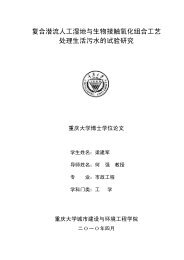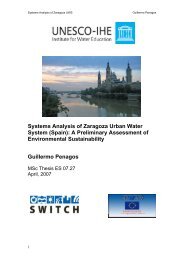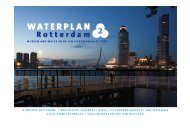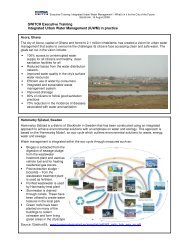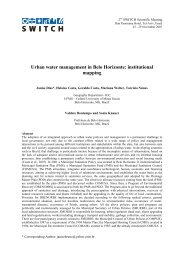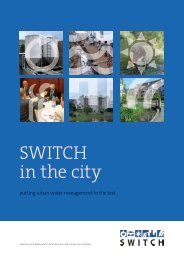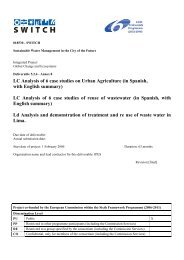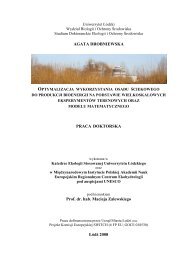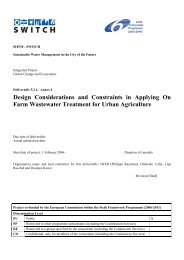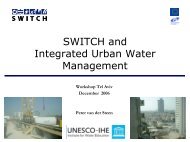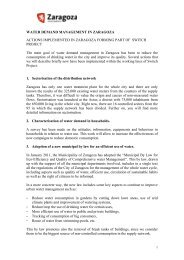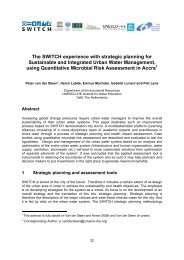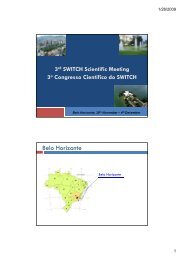Theses for the Future of Water Sensitive Urban Design (WSUD)
Theses for the Future of Water Sensitive Urban Design (WSUD)
Theses for the Future of Water Sensitive Urban Design (WSUD)
Create successful ePaper yourself
Turn your PDF publications into a flip-book with our unique Google optimized e-Paper software.
First SWITCH Scientific Meeting, Birmingham. 2007 Jan.<br />
• The development <strong>of</strong> <strong>the</strong> case study <strong>of</strong> 'Rahlstedt Merkur Park' was approved because <strong>of</strong> <strong>the</strong><br />
possibility <strong>of</strong> developing ano<strong>the</strong>r commercial site called 'Hoeltigbaum' right next to it. The two<br />
developments took place individually and separate from each o<strong>the</strong>r. The water management<br />
system was not connected and it was not even thought <strong>of</strong> that possibility during <strong>the</strong> planning<br />
and construction phases <strong>of</strong> 'Merkur Park'.<br />
It would be favourable to regard <strong>the</strong> whole water system as a network. In terms <strong>of</strong> <strong>the</strong> water balance<br />
this would be an important approach to guarantee matters <strong>of</strong> sustainability as single development areas<br />
differently influence <strong>the</strong> water system. Building sites should not be regarded individually but in relation<br />
to o<strong>the</strong>r development activities. <strong>Future</strong> monitoring and constant enhancement <strong>of</strong> water management<br />
systems are favourable. A cross-border concept <strong>for</strong> <strong>the</strong> water management facilitates <strong>the</strong> pursuit<br />
<strong>of</strong> complex goals concerning water management on a superordinated level. The modification <strong>of</strong> single<br />
elements can be easier dealt with as goals <strong>of</strong> sustainability still can be reached within <strong>the</strong> overall context.<br />
This also <strong>of</strong>fers fur<strong>the</strong>r possibilities related to <strong>the</strong> design.<br />
4 Planning process<br />
Thesis 9: The well known importance <strong>of</strong> <strong>the</strong> demands related to a fair planning process could be<br />
confirmed.<br />
The case studies demonstrate that demands <strong>of</strong> a fair planning process were causal <strong>for</strong> a successful realisation<br />
<strong>of</strong> sustainable storm water management systems.<br />
• In case <strong>of</strong> 'Neuallermoehe West' an interdisciplinary coordination between sectoral planning<br />
was guaranteed. Committees and management teams were established <strong>for</strong> <strong>the</strong> interdisciplinary<br />
coordination. These organisational measures were an important precondition <strong>for</strong> <strong>the</strong> realisation<br />
<strong>of</strong> synergies. For important development projects <strong>the</strong> city <strong>of</strong> Hamburg generally follows <strong>the</strong><br />
approach to set up management teams in terms <strong>of</strong> planning and implementation.<br />
• At <strong>the</strong> 'Trabrennbahn Farmsen' a faire stakeholder involvement (in particular <strong>the</strong> inhabitants<br />
concerned) was an important precondition <strong>for</strong> <strong>the</strong> qualification <strong>of</strong> <strong>the</strong> planning results. On <strong>the</strong><br />
one hand <strong>the</strong> special demands <strong>of</strong> <strong>the</strong> prospective users <strong>of</strong> <strong>the</strong> storm water management system<br />
could be considered early. On <strong>the</strong> o<strong>the</strong>r hand <strong>the</strong> stakeholder involvement at <strong>the</strong> 'Trabrennbahn<br />
Farmsen' goes far beyond <strong>the</strong> development phase and was brought <strong>for</strong>ward.<br />
• Several ef<strong>for</strong>ts <strong>of</strong> <strong>the</strong> district <strong>of</strong> 'Wandsbeck' to realise systems <strong>of</strong> storm water management<br />
could be assigned to <strong>the</strong> dedication <strong>of</strong> <strong>the</strong> water management department. The dedication <strong>of</strong><br />
single participants (so called 'doers') could be confirmed.<br />
• In <strong>the</strong> case studies also several problems concerning planning and realisation were noticed,<br />
which were caused by <strong>the</strong> laws and policies <strong>for</strong> storm water management. So it is not allowed<br />
to divert storm water from private properties in ditches at public streets. These problems have<br />
to be solved in <strong>the</strong> planning process.<br />
Various authors (e.g. Bisch<strong>of</strong>f, et. al. 2005) already described <strong>the</strong> importance <strong>of</strong> <strong>the</strong> demands <strong>of</strong> a fair<br />
urban planning process. These well known demands are also an important precondition <strong>for</strong> <strong>the</strong> realisation<br />
<strong>of</strong> socially sustainable solutions <strong>of</strong> storm water management and should be taken into consideration.



